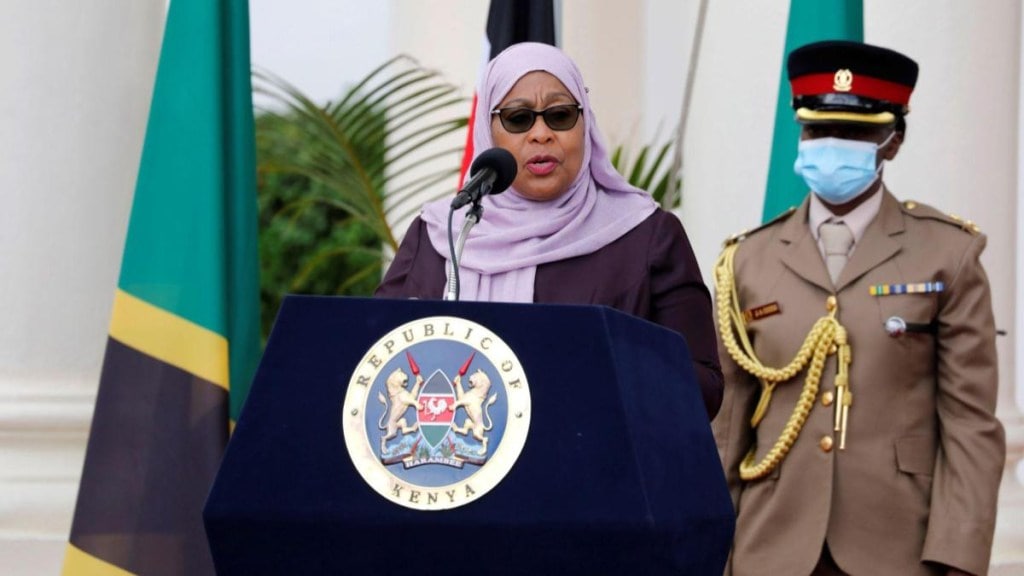Accompanied by a high level ministerial and business delegation, the President of Tanzania Samia Suluhu Hassan, is coming on a State Visit after almost eight years. The upcoming visit is expected to further revitalize and reinforce the historic and friendly relations between India and Tanzania. The visit comes close on the heels of the recent inclusion of the African Union in the G20 under India’s Presidency.
The three day (Oct 8-10) presidential visit is taking place after a gap of almost eight years, according to the official statement of the Ministry of External Affairs, adding the visit at the invitation of President Droupadi Murmu.
Agenda in New Delhi
According to the official statement issued by the Ministry of External Affairs, President Samia Suluhu Hassan, will meet with the President and will be accorded a ceremonial welcome at the forecourt of Rashtrapati Bhawan and thereafter will hold a detailed bilateral dialogue with Prime Minister Narendra Modi.
Also, a state banquet will be hosted by the President in the honour of the visiting leader. On October 10, she will participate in a business and investment forum in New Delhi.
Why is Tanzania important?
Tanzania holds significant importance for India due to its strategic location and vast potential in Africa. During the upcoming visit of President Samia Suluhu Hassan, the discussions are expected to focus on strengthening economic ties, maritime connectivity, pharmaceuticals, energy security, defence, and space cooperation. These efforts aim to establish a lasting partnership that promotes economic growth, regional integration, and people-centric development in line with the shared vision of a prosperous Africa-India alliance.
Tanzania serves as a crucial gateway for Indian businesses in Africa, offering opportunities in agriculture, mining, energy, infrastructure, pharmaceuticals, and information technology. India’s expertise in these sectors can contribute significantly to Tanzania’s economic development, fostering bilateral trade and cooperation.
The African nation’s coastline along the Indian Ocean plays a pivotal role in facilitating trade and commerce, not only for Tanzania but also for landlocked countries in the region. India’s involvement in port development and logistics infrastructure projects can enhance connectivity, promote trade, and strengthen economic integration.
There are substantial energy resources, including natural gas and renewable energy potential and India’s experience in the energy sector can enhance Tanzania’s energy security and resource utilization, paving the way for sustainable development.
Financial Express Online has reported earlier that India has been actively involved in developmental projects in Tanzania, focusing on sectors such as agriculture, healthcare, education, and capacity building. Initiatives like the Indian Technical and Economic Cooperation (ITEC) program contribute to skill enhancement among Tanzanian professionals through training and capacity-building.
Defence collaboration includes joint military exercises and training to enhance interoperability and capabilities in areas such as counter-terrorism, peacekeeping, and maritime security. India’s advanced defence industry can provide Tanzania with access to cutting-edge technology, equipment, and defence manufacturing expertise.
Collaboration in maritime security aims to combat piracy, illegal fishing, and enhance maritime domain awareness, ensuring the safety of sea routes and promoting regional stability.
Both countries can strengthen their cooperation in humanitarian assistance and disaster relief operations, improving disaster management capabilities and response mechanisms.
In the field of space collaboration, India’s expertise in satellite communication and remote sensing technologies can support Tanzania in telecommunications, disaster management, agriculture, and resource mapping. Training and capacity-building opportunities can enhance human capital development and scientific collaboration.
Also, India’s capabilities in weather forecasting and climate studies can benefit Tanzania in meteorological services and disaster preparedness. Collaborative efforts in climate modeling and data analysis can assist Tanzania in mitigating the impact of extreme weather events and climate change.
Satellite-based earth observation and mapping can contribute to effective natural resource management in Tanzania. Leveraging India’s expertise in earth observation satellites and data analysis can optimize resource utilization and monitor environmental changes.
Lastly, as technology advances, both countries can collaborate in strengthening their cybersecurity frameworks, sharing best practices, and conducting joint exercises to enhance resilience against cyber threats. This cooperation can help protect critical infrastructure, safeguard digital assets, and foster trust in the digital domain.
